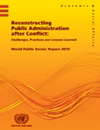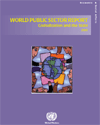|
|
The World Public Sector Report
|
|
The World Public Sector Report, one of UNDESA’s Flagship Reports, aims to capture the emerging issues, concerns and innovations in governance and public administration, especially those that contribute to the realization of the UN Development Agenda including the Millennium Development Goals (MDGs). The World Public Sector Report is intended for policy makers, practitioners and civil society, particularly in developing countries and transition economies.
|
| Reconstructing Public Administration after Conflict |
 2010
2010 |
The 2010 World Public Sector Report brings to the fore a very critical issue - how to reconstruct public administration in post-conflict situations so as to enable it to promote peace and development in countries that have been affected by civil war and destruction. It is a question that has remained unresolved for decades and has brought poverty, despair, and death to people in many corners of the world.
The Report shows that no progress can be made in promoting peace, development and protection of human rights unless appropriate governance and public administration institutions are established, leadership and human resources capacities are re-built, citizens are engaged in the process of reconstruction through decentralized participatory mechanisms and basic public services are delivered. In fact, unless newly established governments are able to provide essential public services to the population, including safety, security, health, education, shelter, access to water and sanitation and job opportunities, there will be no durable peace.The report also emphasizes that because post-conflict situations are heterogeneous, there are no “one size fits all” solutions to governance challenges. In each country, public administration reforms should be tailored to local needs.
Finally, the report highlights that contrary to commonly held belief, post-conflict situations not only present challenges, but also offer numerous opportunities to leapfrog stages of development by adopting innovative practices in public administration, particularly through the application of ICTs in government and service delivery.
|
|
| People Matter: Civic Engagement in Public Governance |
 2008
2008 |
The 2008 World Public Sector Report, People Matter: Civic Engagement in Public Governance, highlights the importance of civic engagement in public governance and by profiling several case studies, demonstrates how such practices gain the capacity to strengthen governance, make it more transparent and accountable and most importantly, contribute to developmental outcomes that are more sustainable, equitable and just.
The Report also highlights several challenges and cautions that adequate attention must be given to the issues of power relations, institutional capacities of the government as well as the civil society organizations and adaptation of methodologies and strategies that suit the local conditions and other factors crucial to the introduction of successful civic engagement practices in public governance.
Please click here for the executive summary. |
|
| Unlocking the Human Potential for Public Sector Performance |
 2005
2005 |
As recommended by the UN Committee of Experts on Public Administration (UNCEPA), the third World Public Sector Report will be published in 2005, with a particular thematic focus on human resources management (HRM). More specifically, the report will explore how the human potential can be unlocked to enhance public sector performance.
UNCEPA, at its Second Meeting in April 2003, stressed that human resources capacity was critical to the quality of public administration. The increasing complexity of both policy-making and administrative processes, as well as the erosion of human resources capacity to carry out those functions, are making it difficult for many Member States to implement national goals and strategies to reduce poverty and to promote sustainable human development, as emphasized in the Millennium Development Goals (MDGs).
|
|
| E-Government at the Crossroads |

2003 |
The World Public Sector Report 2003 presents a view of e-government as a tool for creating public value. It puts e-government development in the context of the United Nations Millennium Declaration, the Report claims that meaningful e-government applications are those that support the environment conducive to human development and suggests that such an environment can be created by a conscious effort "world making". It discusses the special cases of e-participation and privacy, all as part of the main message the ICT by itself will not result in a different, better government, or higher quality of life, but that thoughtful reform and change must precede or go hand-in-hand with in the introduction of ICT to public administrative operations. The Report identifies development of a networked government, management of information and creation of knowledge as the most important e-government application of the future.
|
|
| Globalization and the State |

2001 |
Globalization, although not a new phenomenon, is unquestionably of paramount significance for all countries, developed or developing, rich or poor, large or small. What is globalization? How is globalization affecting the role and functions of the nation- State? Is globalization "good" or "bad"? Is there a universal understanding of its potential or its costs? Can all societies benefit from globalization? Are all States adequately prepared to enable their people to seize the opportunities of globalization while minimizing its negative effects? How should public administration systems be redesigned in view of the changes occurring at the global level?
This Report, written in two parts, attempts to answer these and other essential questions in an objective and clear fashion, based on observed experience and the views of prominent experts on the matter. Part One deals with globalization and the State, and comprises five chapters. Part Two focuses on defining and measuring the size of the State.
|
|
|